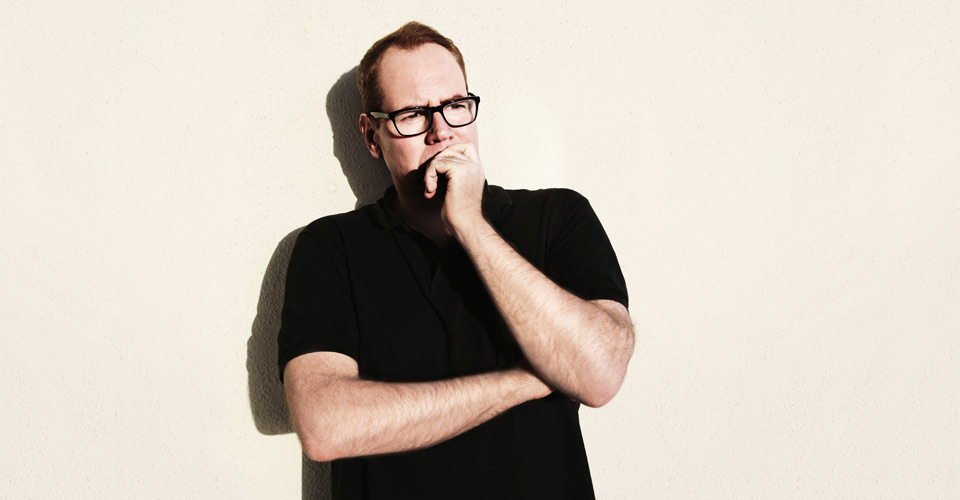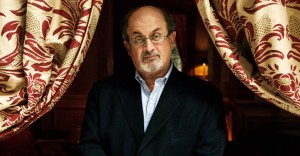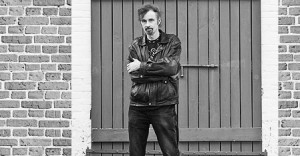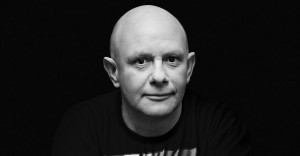Mr. Ellis, have you ever seen a dead body?
Yes, certainly. Growing up in L.A. I have driven past car accidents with a dead body that had not been covered yet. I have seen a dead body, but I have never been brought to a dead body to see it. The first dead body I ever saw was at my school. A bus driver had a heart attack. He was dead and he was still sitting in the seat.
In your novels your write explicitly about violence and death. Is that something you are fond of?
I am very sensitive and a nasty, extreme piece of writing can upset me a lot.
Really? Then how can you write the way you do?
At first I am horrified and I am upset. But by the time I’ve written all the scenes and they’re all completed I am a cool technician. We are now twenty drafts from when I first imagined these images and these horrible scenes and I am numb by that time. I just want to arrange it in a way that I think makes sense in the movements of the novel. I am sad about a lot of what the book is about, because it is based on a lot of my own experience.
Can you tell me an example?
Like in terms of how confused the character is, for example Patrick Bateman. There is a part of me in him. I am not a serial killer or anything, but I was definitely an alienated person in society the same age as he was. And I really thought the society I was a part of was ridiculous and it was full of shit and everyone was awful – and yet I wanted to fit in. I was 23, 24, 25 when I was writing that book and I was extremely depressed with the idea of society and what society expects of you. When I saw all the things people expected you to have to be a happy or a successful man I just thought it was a bunch of bullshit. But I went along with it anyway.
You were a successful writer in your mid-twenties and depressed?
When you become well known the first year is really, really fun and then you spend the rest of your life humiliated or trying to avoid humiliation. Everyone is so nice to you in that first year and then they all want to see something different. They want to see you get fucked up a bit and they want to take you down. It’s just the nature of the world. You can deal with it or you can fight it. Whatever. Then I realized how – this sounds like such a cliché – empty it all is. There is nothing there. It’s an idea. It’s a concept. It’s not real.
After the success of American Psycho you were described as both the enfant terrible and the voice of your generation. Which description can you identify with more?
I am comfortable with both. You can call me anything you want. Just don’t call me fat. I was never writing to become the voice of a generation and I was never writing thinking that I was an enfant terrible. I was just writing what I wanted to write and it was other people who decided that I was or wasn’t those things. I don’t identify with either one.
Have you taken to Twitter to show people who you really are? It seems like you just write whatever is on your mind instead of carefully curating it.
I just have these random opinions about movies or bands or what I am listening to and they end up floating on my little Twitter page and that’s it. I just have this abstract notion that I have 350,000 followers. But what does that mean? I never tweet at people. I’m not a bully. I just have these thoughts. A lot of people do insult others. I get those tweets constantly where people are like, “You are a douche bag!” “You suck!” or “You haven’t been relevant in years!” I get those all the time. A hundred of them a day. I’ve never done that in my life.
Well, you definitely have insulted people before. You even apologized for saying that Kathryn Bigelow is really overrated because she’s “a very hot woman.”
I did apologize for the Kathryn Bigelow tweet because I had too many women who were friends of mine, and my mother, and my sisters, say: “You really have to understand what you’re doing and how it’s coming off. What did you mean by that?” It was a week of being kind of annoyed. And you don’t get to actually say anything in a tweet. You can’t. What can you say in 140 characters? It encourages you to make statements and be a provocative person without being nuanced.
So what were you trying to say about her?
What I really wanted to do was make a statement not about Kathryn Bigelow, but about a film industry that is pretty sexist. It needs to protect itself, or feel good about itself and, therefore, makes a woman who maybe isn’t the best filmmaker into a symbol. And if you tarnish that symbol you get a lot of shit for that. She makes them feel good about the fact that they live and work within an incredibly sexist industry. That was what I wanted to say, but I ended up looking like a misogynist. More and more I regret the apology. The piece that I did write was chopped in half; it was originally much more about writing tweets on Twitter and less an apology. It was also about other things. So I wish I hadn’t posted it, but I did.
Do you often have the feeling that people misunderstand you?
I feel that I am portrayed in the press as being this person who wears masks. But I feel that I am a completely transparent person and yet people seem to think that I am not. They are unable to deal with my candor and my honesty. I remember a girl, it was for this New York Magazine piece that came out a few months ago, that was very shocked when I talked about this cocaine mistake that I made.
That sounds interesting.
I tweeted drunkenly that I wanted some coke. And I said: I am going to tell you the whole story and you can print it. I don’t care. This is what really happened. She said: “I am really shocked that you are going to talk about this.” And I said, “What’s wrong about it? Why can’t you talk about it?” She thought I was playing a kind of game. Because I was so upfront in talking about it, that she was not able to believe that I was telling her the truth.
Well a lot of people wouldn’t be honest in a situation like that.
But those days are over. We don’t live in that world anymore. Some people still live in this shadow world of non-transparency and inauthenticity. I think that world is leaving us, because of – yawn! – technology, social media and the overabundance of sharing. You really can’t lie anymore.
Because you will get caught?
Exactly. Young people nowadays post private things about themselves daily. If you look at Frank Ocean or Lena Dunham there is a whole new sensibility at play of not being afraid of who you are and showing that. There is no going back to my parents, where everyone thought that your dignity depended on your secrecy. That world is gone.
If I tried to order coke via Twitter no one would care because I don’t have 350,000 followers. But because you do maybe people think that you are setting a bad example.
A bad example for what? For being a stupid clown who would order cocaine drunk on his iPhone? I was setting the example of being a clown and a loser with my cocaine tweet. The example is: that is a loser. People should say, “I don’t want to be that loser.” I have never promoted drug taking.
Have you ever had problems with drugs?
I guess I was lucky in that sense. I’ve never been an addict. I could always deal with it. It was on the weekend. It was fun. It was never a lifestyle. There was always work to do and too many other things that I was interested in. And I really wasn’t interested in drugs every single day of my life in my apartment. I was interested in doing them for fun, because it felt good. And I feel no need to hide that part of myself. Just as I feel no need to hide any part of myself anymore.
None at all?
I want to be an authentic person. And I feel that when people react in an extreme way, like to the cocaine tweet, I start to feel that it’s a mission. I am not going to hold back on an opinion I have about something; I don’t know what the point of that would be. Because people would’t like me?
Return to Top

Short Profile
Name: Bret Easton Ellis
DOB: 7 March 1964
Place of Birth: Los Angeles, California, USA
Occupation: Writer





















this is an interesting read. in retrospect, after seeing the film adaptation of his book, it never occurred to me who the person behind the fiction was. the transparency is real.
Wow. You could have asked a couple more questions. This is a very good one.
Keep up the good work.
I feel like Bret is the kind of guy who wishes he was like Patrick bateman but really he’s more like the gay man in American psycho who lusted after bateman. Bret is not the hot guy in his books like he thinks he is, he’s the guy dreaming of being that guy. Patrick was like a great white shark awesome physically but dark and Bret is more like a bottom feeder or that little fish swimming in the sharks shadow waiting for scraps. He wants to be controversial because that’s what made him famous, why would he be kind that’s not what gets him attention. As we all know and can tell he is a “wanna-be” that couldn’t be, but keep on insulting others we all know it makes you feel better about your manhood. A pint of ice cream might help.
P.s. Patrick bateman would cringe at the thought of someone like Bret easton ellis existing. He would leave saying I have to return some video tape.
P.s.s no offense just an observation
why is it that people who say offensive things like to say “no offense”?
I feel like you are the kind of guy who wishes you were Bret Easton Ellis.
Well said, David. Sounds like a pretty jealous troll up there.
David, I think Bret Easton Ellis loves you.
Patrick Bateman is Bret Easton Ellis on 5 eight balls of coke & 10 grams of shake and bake.
I feel like you’re the kind of guy who can’t comprehend that when writers do their work they are not their characters. I don’t know that a pint of ice cream could help you. You’re not the smart guy like you think you are, you’re the guy dreaming of being smart one day. Bottom feeders indeed.
@David, Seconded lol
I do not believe you read that interview and understood his words. I would reconsider your thoughts about Ellis, he is not wanting to be Patrick, he hates Patrick. Where are you?
Interesting.
I love Ellis, and I love his writing.
I disagree that he’s no longer relevant; it’s the opposite, he’s more relevant than he’s ever been.
I only wish he’d go back to writing books.